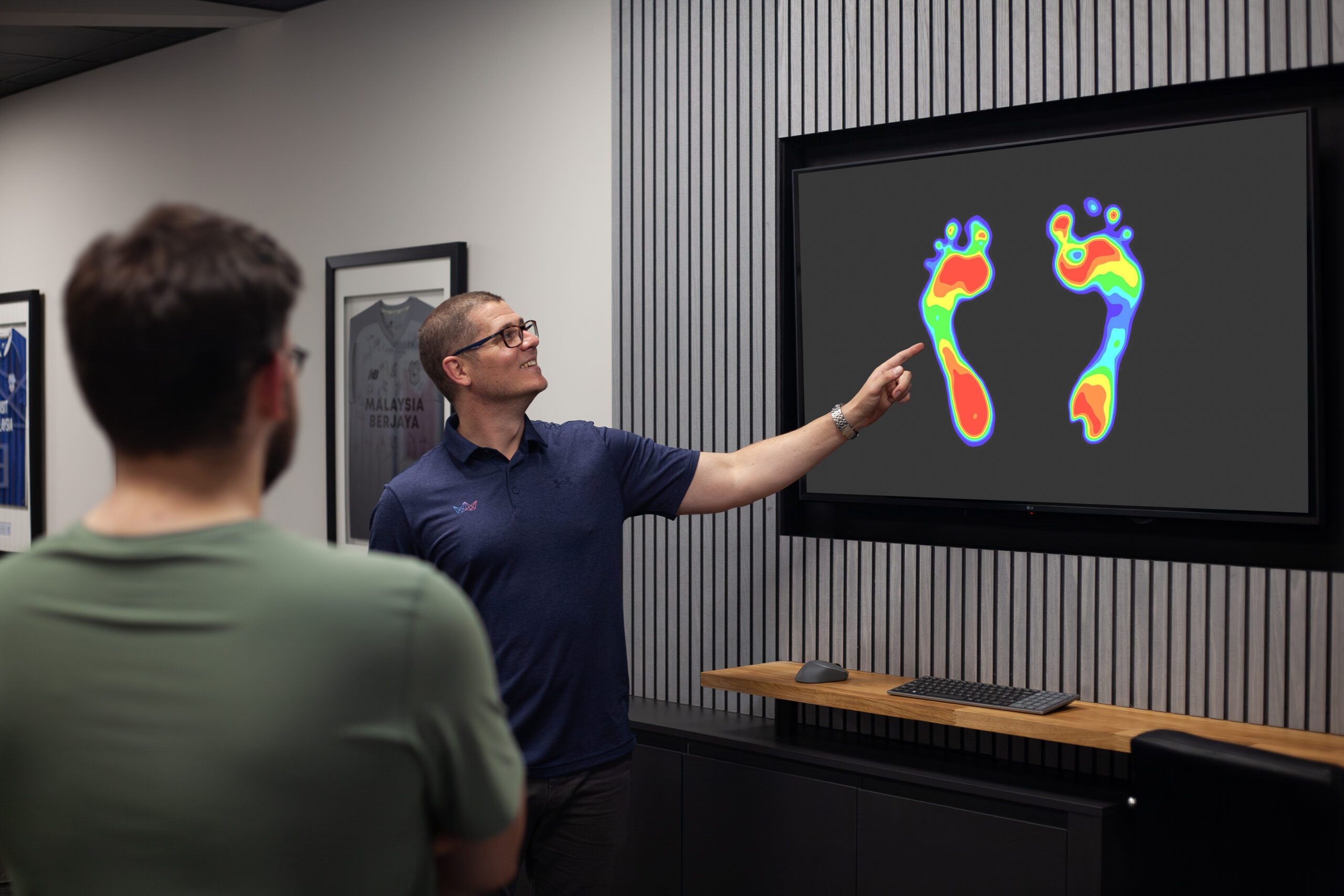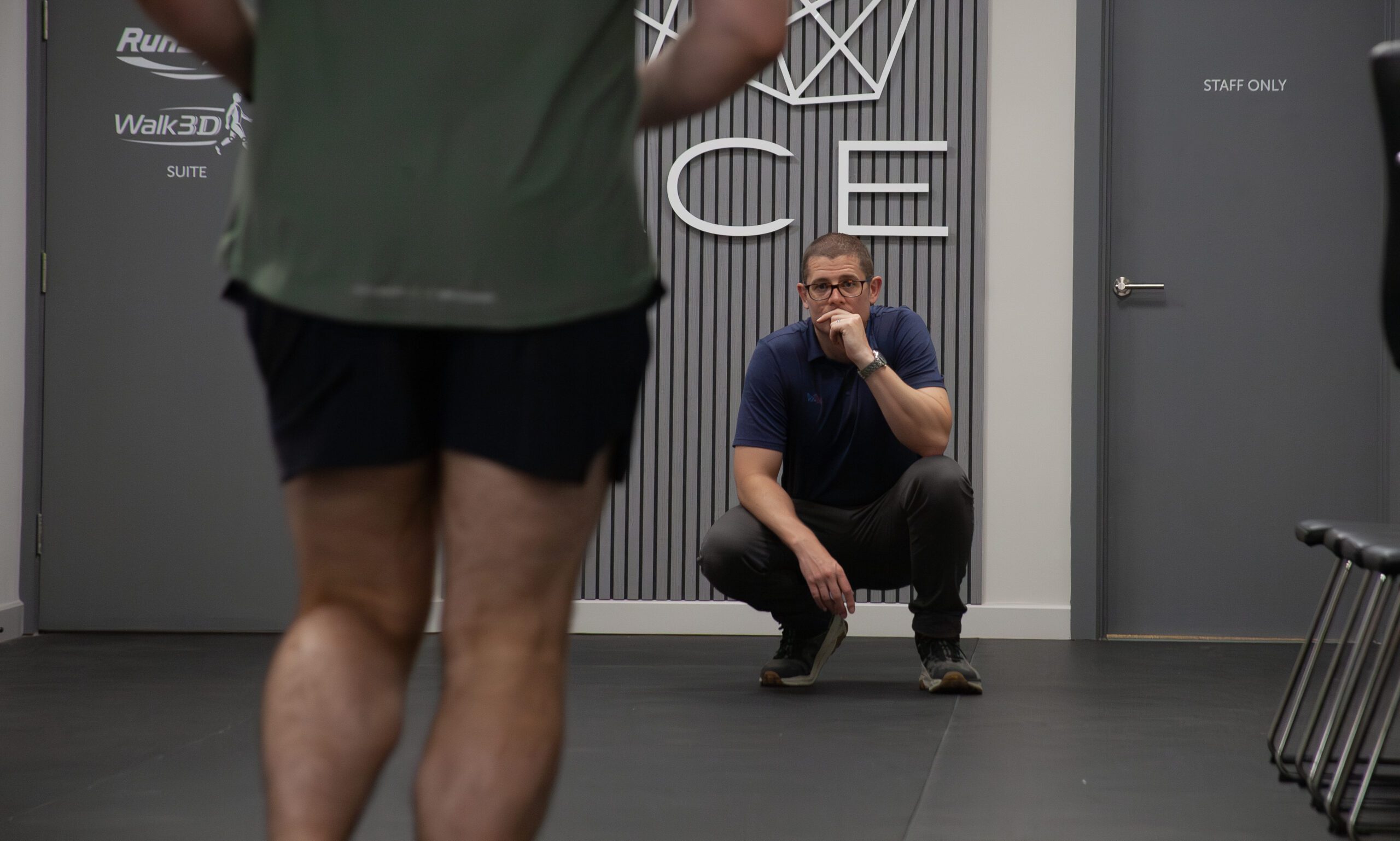Advice assessment £75
This includes:
- 30 minute appointment
- Discussion of pain/injury
- Range of movement testing
- Treatment plan put in place

It is well accepted that many problems relating to the foot, ankle, knee, hip and lower back can be caused by irregular movement of the foot.
Book an appointmentAn assessment, incorporating physical examination and analysis using the latest computerised scanning technology by our experienced Podiatrists, will help to identify any irregularities in the way in which your foot functions whilst moving.
If necessary, we will prescribe functional insoles to rectify any such discrepancies by supporting and correcting the foot throughout the gait cycle. As a result, reducing the stress and strain on muscles, ligaments and joints, which contribute to the cause of the conditions mentioned. We will also look to prescribe personalised strength and rehabilitation exercises to help with your recovery.
During walking and running the foot must:
• Act as a shock absorber
• Be mobile in order to adapt to uneven ground
• Be a rigid lever in order to propel you forward efficiently
All three functions depend on the correct movement of the foot. The foot acts as both a rigid lever and a mobile adapter in gait and undergoes many changes of position when we walk and run. Foot biomechanics is the science of assessing foot function and relating this to foot pathology. An accurate diagnosis can be achieved by using both conventional principles and digital diagnostic techniques.
Many people suffer from pain in their feet, ankles, knees, hips and lower back, but not many realise that this can be caused by poor foot alignment. At Ace Feet in Motion, we have experienced qualified podiatrists available, with extensive knowledge of foot function and biomechanics. By attending our clinic we can carry out a full assessment with the computerised scanning system wherever necessary and formulate a treatment plan.
At ACE we would assess any lower limb injury, over the years we have become specialists in the treatment of common conditions seen week in, week out. Here is a list of the most common conditions treated here at ACE.
This is pain and inflammation of your Plantar Fascia. Your Plantar Fascia is a strong band of fibrous tissue (like a ligament) that stretches from your heel to toes. It supports the arch of your foot and also acts as a shock-absorber. Pain usually presents on the underside of the heel slightly towards the inside and is more noticeable first thing in the morning and/or after rest. This can be very painful but with the right treatment it should improve fairly quickly.
Learn moreThis is pain and swelling (inflammation) of the Achilles tendon, which is the big tendon at the back of your ankle that attaches your heel bone to your calf muscles. This condition affects as many as 20% of runners but also commonly affects walkers, cross fitters, gym goers and many more. This often comes on over a period of time and can start to affect your performance. Get this looked at sooner rather than later as you will have a quicker chance of returning to activity.
Learn moreThis is the most common cause of heel pain in children aged between 9 and 14. This is caused by swelling of the growth plate in the heel. By squeezing either side of the heel bone you can often re-create discomfort therefore confirming the condition. The combination of growth & high levels of activity combined with very flat sporting shoes (football boots, spikes etc.) is the perfect combination to cause Sever’s Disease.
Learn moreoften affecting the inside of the lower third of the Tibia (shin bone). This is most commonly caused by overuse and inflammation of Tibialis posterior muscle, which then leads to stress on the bone. This is very common amongst runners but can also be seen in anyone who participates in walking or running related sports.
Learn moreThis is pain in the outer side of the shin bone which affects the Tibialis anterior muscle. This is less common than medial shin pain but can certainly affect lots of people partaking in walking/running related sports or activities.
The posterior tibialis tendon is one of the major supporting structures of the foot and ankle, helping it to function whilst walking. Posterior Tibialis tendon dysfunction is a condition caused by changes in the tendon, impairing its ability to support the arch of the foot, resulting in pain, weakness and visual changes in foot posture.
Learn moreThe calf complex is made up of two muscle groups, your Gastrocnemius and Soleus. Calf pain is commonly associated with many sports including any running, jumping or explosive sports. A number of factors can lead to calf pain including trauma, increased activity as well as certain foot types.
This is one of the most prevalent injuries among runners and is caused by tightness and inflammation in the Iliotibial Band which starts in your hip and attaches in your knee. The most common symptom of this injury is a sharp stabbing discomfort on the outside of the knee which seems to get worse the more you do and will often stop runners from being able to train.
Learn moreThis is an injury that affects the tendon that sits below the knee cap. This is often caused by an increase in exercise or load. This injury is often referred to as “jumpers knee”.
This is often described as a dull ache at the front of the knee or underneath the knee cap. This pain can be increased by walking or running.

Medical appointments can be a little scary sometimes so we do everything we can to put your mind at rest. Here we explain what to expect during your appointment:
Book an appointmentAt the start of the appointment our podiatrist will likely run through some questions with you about the injury for example, where is the pain located, how long have you experienced pain etc. These questions are necessary so that we can work out contributory factors that might be influencing your injury and will help us lead to a diagnosis.
Our podiatrists will perform an in-depth assessment of the lower limb to help us understand what the injury is, what tissue is being affected and what factors might be contributing. We make every effort to talk you through your injury on a level that you can understand and will try to minimise the amount of medical terminology. Our ethos is if you understand the injury, you have a better chance of helping yourself recover.
Once the assessment is completed we will decide of the best treatment plan. You will have input here and together we will come up with a plan that works for you. Every plan will be unique to you individual needs.
Our Biomechanical Assessments are now available at our Cardiff HQ clinic. You can book these assessments online or you can call us to discuss these appointment types in more detail.
This includes:
This includes:
This includes:
This includes:
This includes:
Our HCPC Registered Podiatrists have spent a minimum of 3 years at university studying towards a BSc in Podiatry.
We’re here to help! If you have any questions or need further information, please don’t hesitate to reach out to us. Our team is dedicated to providing you with the best service possible and is always ready to assist you.
Whether you’re curious about our services, need support, or just want to chat, we’re eager to hear from you.
Below we have answered some frequently asked questions we regularly get at our clinics prior to your appointment.
We would recommend wearing shorts to our appointment as we would often need access to your knees.
We recommend bringing any footwear that you are experiencing problems in. If you are booking in for running analysis then you need to bring your running footwear. The more info we have the better, so don’t be afraid to bring more as opposed to less.
We have a full list of prices available here. All treatments will be discussed during your appointment and before we action anything you will have full control over what you end up with. Finance options will be available in the near future, please get in touch with our team here to discuss options.